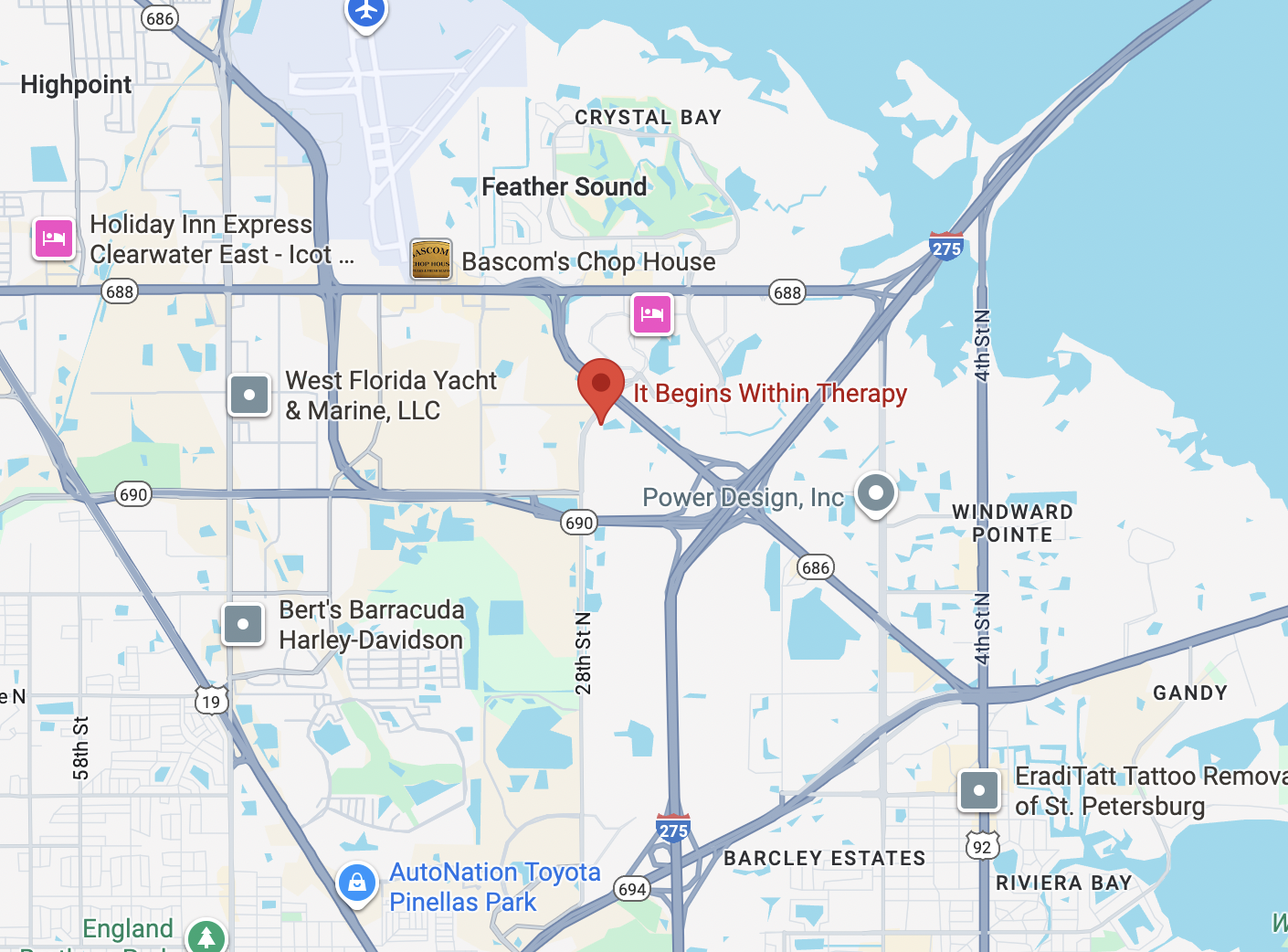Cognitive Behavioral Therapy in Tampa, St. Petersburg & Sarasota
At It Begins Within, we provide Cognitive Behavioral Therapy (CBT) for adults, children, and teens in Tampa, St. Petersburg, and Sarasota. Our licensed therapists help clients understand how thoughts, emotions, and behaviors are connected—and how shifting unhelpful patterns can lead to real, lasting change.
Whether you’re navigating anxiety, intrusive thoughts, trauma, or overwhelming stress, CBT offers practical tools to help you feel more grounded, confident, and in control. Therapy is collaborative, structured, and tailored to your needs—so you’re not just talking about challenges, but learning skills you can use in everyday life.
What is Cognitive Behavioral Therapy
Cognitive Behavioral Therapy is a highly researched, goal-oriented talk therapy that focuses on the interplay between thoughts, emotions, and behaviors. It helps identify and challenge negative thought patterns that contribute to emotional distress and unhelpful behaviors. CBT is effective for a wide range of conditions, including anxiety disorders, depression, PTSD, OCD, and more.
Unlike traditional therapies, CBT emphasizes present-focused strategies and homework assignments to build skills for real-world application. Sessions are structured, collaborative, and typically short-term (6-20 sessions), making it accessible for busy individuals in Tampa, St. Petersburg, and Sarasota.
How Does CBT Therapy Work?
Cognitive Behavioral Therapy works by helping you identify unhelpful thought patterns, understand how they affect your emotions and behaviors, and practice new skills that create lasting change in daily life.
Effectiveness of Cognitive Behavioral Therapy
Cognitive Behavioral Therapy is one of the most evidence-based treatments in mental health, with extensive research supporting its efficacy. Studies show that CBT can reduce symptoms of anxiety and depression by 50-60% in as few as 12 sessions. For PTSD, it offers long-term benefits, and for OCD, it matches or exceeds medication outcomes.
Conditions COMMONLY treated with Cognitive Behavioral Therapy
Anxiety and panic disorders
Stress and overwhelm
Chronic Pain
Life transitions and relationship struggles
Sleep Disorders & Insomnia
Cognitive Behavioral Therapists in Sarasota, St. Petersburg & Tampa
Cognitive Behavioral Therapy (CBT) in Sarasota at It Begins Within is practical, skills-based, and personalized to real life—not just theory. Our Sarasota therapy team works with children, teens, and adults who want tools they can actually use to manage anxiety, OCD, social stress, and overwhelming thought patterns.
Our clinicians specialize in CBT for OCD, including Exposure and Response Prevention (ERP), as well as CBT for social anxiety, panic, and chronic worry. Clients learn how thoughts, emotions, and behaviors interact—and how to interrupt unhelpful cycles using structured CBT exercises that build confidence over time.
We also provide CBT for kids and teens in Sarasota, helping younger clients develop emotional regulation, coping skills, and healthier thinking patterns in ways that are age-appropriate and parent-supported. Therapy is collaborative, goal-oriented, and tailored to your pace—not rushed or one-size-fits-all.
Our Sarasota office serves individuals and families from Lakewood Ranch, Fruitville, Palmer Ranch, Gulf Gate, Siesta Key, University Parkway, and surrounding communities who are looking for evidence-based care from experienced therapists who understand both clinical best practices and local life stressors.
Cognitive Behavioral Therapy (CBT) in Tampa at It Begins Within focuses on helping people make sense of overwhelming thoughts and turn insight into action. Our Tampa therapists work with adults, teens, and children who feel stuck in cycles of anxiety, avoidance, overthinking, or self-doubt and want practical tools they can use outside the therapy room.
Our team provides CBT for OCD, including Exposure and Response Prevention (ERP), as well as CBT for social anxiety, panic, and performance-related stress. Therapy is structured but flexible, combining evidence-based CBT exercises with real-world application so progress continues between sessions—not just during them.
We also offer CBT for kids and teens in Tampa, helping younger clients build emotional awareness, problem-solving skills, and healthier thinking patterns while supporting parents along the way. Sessions are collaborative, goal-oriented, and adapted to each client’s age, personality, and pace.
Our Tampa office serves individuals and families from South Tampa, Downtown Tampa, Hyde Park, Westshore, Carrollwood, and surrounding Hillsborough County communities who are looking for thoughtful, evidence-based therapy delivered by experienced clinicians who understand the pressures of busy professional and family life.
At It Begins Within our CBT therapy in St. Petersburg is focused on helping clients break patterns that feel exhausting, overwhelming, or hard to control. Our St. Petersburg therapists work with children, teens, and adults who struggle with anxiety, intrusive thoughts, social stress, and behavioral habits that interfere with daily life.
We provide CBT for OCD, including Exposure and Response Prevention (ERP), as well as CBT for social anxiety, panic, and persistent worry. Therapy is structured and intentional, using practical CBT exercises that help clients understand how thoughts influence emotions and behaviors—and how to respond differently when those patterns show up in real situations.
Our St. Petersburg team also offers CBT for kids and teens, supporting emotional regulation, confidence, and coping skills during critical developmental years. Treatment is collaborative and paced to the individual, with thoughtful involvement from parents when appropriate.
We serve individuals and families throughout St. Petersburg, Pinellas Park, Gulfport, Seminole, Tyrone, and nearby Pinellas County communities who are looking for evidence-based therapy from experienced clinicians in a calm, supportive setting.
What to Expect in CBT Therapy Sessions at It Begins Within
CBT helps you identify and change negative or unhelpful thought patterns that fuel negative emotions or behaviors. With a licensed therapist, you will:
Identify and become conscious of the the unhelpful thoughts that are “popping up”
Learn strategies like cognitive reframing and behavioral activation
Use structured exercises to shift emotional responses
Track your progress and adjust goals along the way
Components and Techniques of CBT
CBT is built on core components that drive change. These include:
Cognitive Restructuring: Identifying and challenging distorted thoughts
Behavioral Activation: Encouraging positive actions to combat avoidance.
Exposure Techniques: Gradual facing of fears, especially in OCD or PTSD.
Homework Assignments: Real-life practice, like journaling or relaxation exercises.
Relaxation and Mindfulness: Tools for stress management.
Our sessions in Tampa, St. Petersburg & Sarasota incorporate these components of cognitive behavioral therapy for tailored results.
Types of CBT Therapy Offered at IBW in Tampa, St. Petersburg & Sarasota
Standard CBT
Focuses on cognitive restructuring and behavioral activation.
Trauma-Focused CBT
Integrates trauma processing with coping skills.
CBT for Insomnia (CBT-I)
Targets sleep patterns without medication.
Dialectical Behavior Therapy (DBT)
DBT Combines CBT with mindfulness for emotional regulation.
Exposure and Response Prevention (ERP)
A CBT subtype for exposure to fears.
Cognitive Behavioral Therapy for Kids
CBT is one of the most research-backed therapy approaches for helping children manage anxiety, depression, behavioral challenges, and emotional regulation. At IBW, our child therapists use TF-CBT, and age-appropriate CBT strategies to help children understand their thoughts, change unhelpful behaviors, and feel more confident in daily life.
Whether your child is struggling with performance anxiety (at school or in sports), social anxiety, or developmental challenges, CBT offers practical, evidence-based tools they can learn and use. In therapy, children are guided to recognize anxious thoughts, build confidence through coping skills, and gradually face the situations they fear with compassionate support every step of the way.
behavioral therapy for kids
Many children experience intense emotions that lead to outbursts, irritability, or oppositional behavior. Our therapists use CBT, including TF-CBT, to help children develop healthier ways to manage anger and regulate their emotions.
CBT teaches children how to:
Identify triggers that lead to frustration or explosive behavior
Strengthen emotional regulation and calming skills
Use self-control and problem-solving techniques in real-life situations
“Trauma-Focused Cognitive Behavioral Therapy is a gold-standard treatment that not only reduces trauma symptoms but also equips children and families with skills for long-term emotional health. At IBWHC, we are proud to deliver TF-CBT with compassion and evidence-based rigor to support Tampa children’s healing and growth.”
Dr. Mary Perleoni, Ph.D., LMHC, Tampa TF-CBT Specialist
Cognitive Behavioral Therapy for Teens
Adolescence is a critical time for emotional development, identity formation, and coping with increasing academic, social, and performance-related pressures. Cognitive Behavioral Therapy for teenagers helps adolescents understand how their thoughts, emotions, and behaviors are connected—and how small shifts in thinking can lead to meaningful changes in mood, confidence, and decision-making.
At It Begins Within, our therapists work with teens who are struggling with anxiety, depression, OCD, social anxiety, school stress, perfectionism, emotional regulation, and negative self-talk. CBT gives teens practical, age-appropriate tools to challenge unhelpful thought patterns, manage big emotions, and build healthier coping strategies they can use in real life—at school, at home, and with peers.
Our approach balances teen autonomy with thoughtful parent involvement when appropriate. Sessions are collaborative, structured, and supportive, helping teens feel understood rather than “talked at.” Whether your teen feels overwhelmed, stuck in anxious thinking, or frustrated by their own reactions, CBT provides a clear framework for growth—one that empowers teens to develop resilience, self-awareness, and confidence as they move forward.
CBT is Highly Effective in Treating
cbt for trauma
Cognitive Behavioral Therapy helps teens process traumatic experiences by addressing unhelpful beliefs, emotional responses, and avoidance patterns that often follow trauma. Our therapists use structured, evidence-based approaches to help teens regain a sense of safety, control, and emotional stability—at a pace that feels supportive and empowering.
cognitive behavioral therapy for ptsd
For teens experiencing PTSD symptoms such as intrusive thoughts, hypervigilance, emotional numbing, or reactivity, CBT provides practical tools to reduce distress and reframe trauma-related thinking. Treatment focuses on helping teens understand their triggers, regulate their nervous system, and rebuild confidence in daily life.
cbt for anxiety & social anxiety
CBT is one of the most effective treatments for teen anxiety and social anxiety. Teens learn how anxious thoughts fuel fear, avoidance, and self-doubt—and how to challenge those patterns with realistic thinking, coping strategies, and gradual exposure. This approach is especially effective for school anxiety, performance pressure, and fear of judgment.
cognitive behavioral therapy for ocd
CBT helps teens with OCD break free from obsessive thought cycles and compulsive behaviors. Treatment focuses on understanding the OCD loop and developing healthier responses to intrusive thoughts. Our therapists tailor CBT strategies to each teen’s symptoms, helping them feel more confident and in control over time.
Frequently Asked Questions About CBT
Answered by our therapy team
Does CBT Work for Anxiety and Depression?
Yes, CBT is one of the most evidence-based therapies for anxiety and depression, with numerous studies showing it reduces symptoms by 50-60% in many cases. As Dr. Mary Perleoni, a licensed psychologist with over 25 years specializing in CBT at It Begins Within Therapy in Tampa Bay, explains: "CBT empowers clients to challenge distorted thoughts like 'I'm a failure' during depressive episodes or 'catastrophizing' in anxiety, leading to sustainable emotional shifts." It's particularly effective for generalized anxiety disorder (GAD), panic attacks, and major depressive disorder, often outperforming medication alone in long-term outcomes, according to meta-analyses from the American Psychological Association.
How Long Does CBT Take and How Many Sessions Are Needed?
Most clients experience meaningful change in 6-12 sessions, but this varies by complexity—milder issues like specific phobias may resolve in 4-8 weeks, while chronic conditions like PTSD could require 12-20 sessions or ongoing support. Dr. Perleoni notes: "In my Tampa practice, we tailor session length to individual goals; for example, CBT for anxiety in adults often shows rapid progress in 8-10 weeks with homework reinforcement." Sessions are typically weekly, lasting 45-60 minutes, making it a time-efficient option compared to longer-term therapies.
Can CBT Help with Sleep Issues Without Medication?
Absolutely—CBT for Insomnia (CBT-I) is the gold-standard non-drug treatment, with success rates of 70-80% in improving sleep quality long-term, per clinical trials. Dr. Perleoni advises: "CBT-I addresses sleep myths and habits, like restricting bed time to build sleep drive, helping Tampa Bay clients break cycles of rumination without relying on pills." It's ideal for chronic insomnia, often resolving issues in 4-8 sessions, and is recommended by the American Academy of Sleep Medicine over medications for sustained results.
Is CBT Right for Me? Who Benefits Most from Cognitive Behavioral Therapy?
If you're motivated to explore and change unhelpful thought patterns and behaviors, CBT could be an excellent fit—it's versatile for adults, teens, kids, and those with conditions like OCD, ADHD, or eating disorders. Dr. Perleoni emphasizes: "CBT shines for goal-oriented individuals seeking practical tools; in my Sarasota sessions, it's transformed lives for those with trauma or stress, but it requires active participation." Not ideal for everyone—if you're dealing with deep-seated personality issues, it may pair well with other approaches. Consult a therapist to assess fit based on your symptoms.
What Happens in a Typical CBT Session? What Techniques Are Used?
Sessions involve collaborative goal-setting, where you'll discuss recent challenges, identify negative thoughts (e.g., via Socratic questioning like 'What evidence supports this belief?'), and practice skills like cognitive restructuring or exposure exercises. Dr. Perleoni describes: "We start with homework review, then use worksheets to track thoughts-emotions-behaviors, building tools for real-life application—it's structured yet empathetic." Expect interactive elements, not just talking, to foster lasting change.
How Does CBT Differ from Other Types of Therapy Like Psychodynamic or DBT?
Unlike psychodynamic therapy, which explores unconscious past influences over years, CBT is short-term and focuses on present thoughts and behaviors for quick results. Dialectical Behavior Therapy (DBT) adds mindfulness and emotion regulation, ideal for borderline personality disorder. "CBT's evidence-based, action-oriented approach sets it apart—it's about 'doing' versus 'uncovering,'" explains Dr. Perleoni, who blends elements in her Florida practice for customized care.
Can CBT Be Combined with Medication or Other Therapies?
Yes, CBT often enhances medication outcomes, like pairing with antidepressants for depression (boosting remission rates by 20-30%, per studies). It integrates well with exposure response prevention (ERP) for OCD or acceptance and commitment therapy (ACT) for chronic pain. Dr. Perleoni recommends: "In Tampa Bay cases, combining CBT with meds provides comprehensive relief—consult your provider for a tailored plan." This hybrid approach addresses both biological and psychological aspects effectively.

Free Consultation for Cognitive Behavioral Therapy Near Me
We offer comprehensive mental health services and free consultations for all of our skilled therapists. Our belief is that the strongest factor in your success through therapy is the relationship with your therapist - and we want to ensure that.












